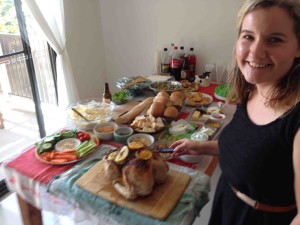Amy, Sorenne and I began eight weeks of skating lessons at the local arena Satuday (I suck after seven years of no ice, thank you Kansas), started cooking the Canadian Thanksgiving feast at 3 a.m Sunday, and have had hockey on in the background since 4 a.m.
I try to be super-extra careful when cooking a big bird because of the potential for cross-contamination, and the potential of sickening a bunch  of what-would-become former friends.
of what-would-become former friends.
But in some cases, extra care is not enough.
As the Salmonella Heidelberg outbreak linked to Foster Farms hits 317 sick, Costco has ordered a recall of nearly 40,000 pounds of rotisserie chickens after one tested positive for Salmonella on Friday.
That’s a cooked chicken. To paraphrase Bill Marler, if Costco can’t cook the poop out of a bird, why are consumers expected to?
Still, company types, many government types and other types, insist all will be well if the chicken is just cooked properly.
This is a terrible message, and not scientifically accurate.
Chapman at least got a few correct points in when he told Live Science cross-contamination can happen at any point in the cooking and handling process, starting at the grocery store, don’t wash the bird, and use a damn thermometer.
(I gave one to an IT friend here for the Thanksgiving food orgy.)
After threatening Monday to close three Foster Farms processing plants, the U.S. Department of Agriculture agreed on Thursday to allow the plants to continue operating with advanced, super-secret safety procedures.
Neither the company nor USDA will say what these procedures are. Doesn’t build confidence.
Which would be an additional reason the list of retailers recalling Fosters products is growing.
Lynne Terry of the Oregonian writes that Costco’s El Camino Real store in San Francisco, Calif., is pulling and products over Salmonella contamination. The recall includes nearly 8,800 Kirkland Signature Foster Farms rotisserie chickens and more than 310 units of Kirkland Farm rotisserie chicken soup, rotisserie chicken leg quarters and rotisserie chicken salad.
The products were sold to Costco customers at the El Camino Real store between Sept. 11 and Sept. 23, the notice said. The chickens were processed at three Foster Farms plants in central California.
Fred Meyer and QFC stores have withdrawn chicken from the same plants. They were sold under the brand names of Simple Truth Organic and Kroger Value. The voluntary withdrawal also includes deli chicken and rotisserie chickens.
Melinda Merrill, Fred Meyer spokeswoman, said the stores are still selling the Foster Farms labeled poultry that came from a plant that’s not been implicated in the outbreak.
This outbreak differs in that the variety of salmonella is especially virulent.
There are seven strains of salmonella Heidelberg involved in the outbreak. Several of them are antibiotic-resistant and “one of the strains that we’ve tested is resistant to seven antibiotics,” said Christopher Braden, director of the Centers for Disease Control and Prevention division of foodborne diseases.
Of the people infected, 42% have been hospitalized — an unusually high percentage, according to the CDC.
“That’s about twice what we would normally see for a salmonella outbreak,” Braden said. “We think that’s at least in part due to the fact that a number of these strains have resistance to one or more antibiotics.”
Thirteen percent of those sickened have salmonella septicemia, a serious, life-threatening, whole-body inflammation, Braden said. Normal for salmonella would be “just a few percent,” he said.
In a statement, Foster Farms CEO Ron Foster said “we have worked relentlessly to address these issues and will continue to do so as we work to regain consumer trust and confidence in the Foster Farms brand.”
Those comments do not bolster consumer confidence.
If you’ve got a good food safety system, brag about it. Because some companies are better.

.jpg) turkey processing business said at the time, the company has implemented the most aggressive salmonella monitoring and testing program in the poultry industry.
turkey processing business said at the time, the company has implemented the most aggressive salmonella monitoring and testing program in the poultry industry..jpg) • 48.0 oz. (3 lb.) trays of Kroger Ground Turkey Fresh 85/15 with Use or Freeze by Dates of 09/17/2011, 09/18/2011 and 09/19/2011
• 48.0 oz. (3 lb.) trays of Kroger Ground Turkey Fresh 85/15 with Use or Freeze by Dates of 09/17/2011, 09/18/2011 and 09/19/2011
.jpg) conservative after a big salmonella outbreak in 2008. The U.S. Food and Drug Administration first linked it to tomatoes, only to find out later that jalapeno peppers were the most likely cause. The tomato industry cried foul after it got crushed financially.
conservative after a big salmonella outbreak in 2008. The U.S. Food and Drug Administration first linked it to tomatoes, only to find out later that jalapeno peppers were the most likely cause. The tomato industry cried foul after it got crushed financially..jpg) Thursday that it was a slowly building outbreak in the beginning.
Thursday that it was a slowly building outbreak in the beginning.